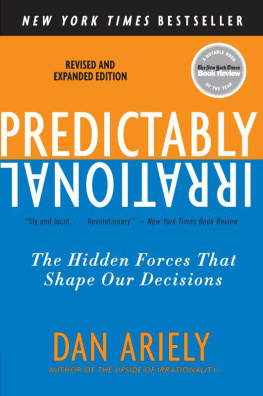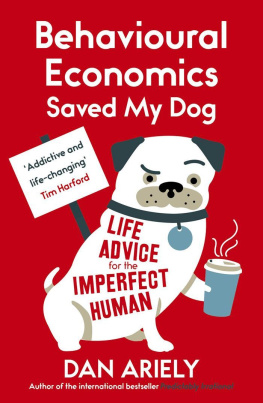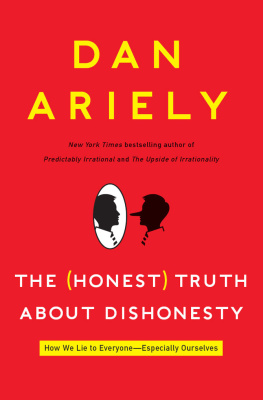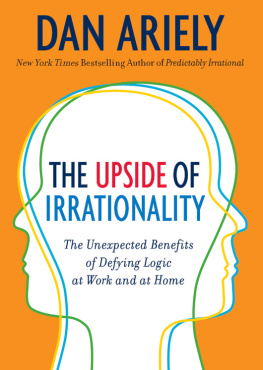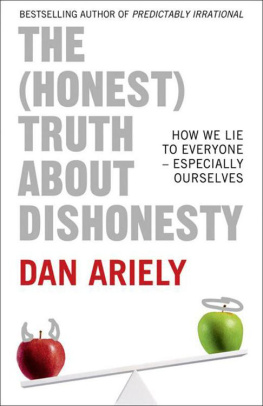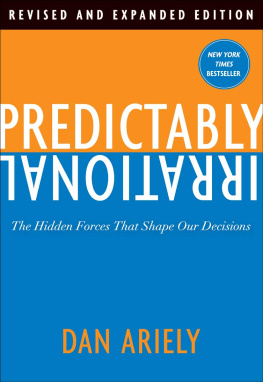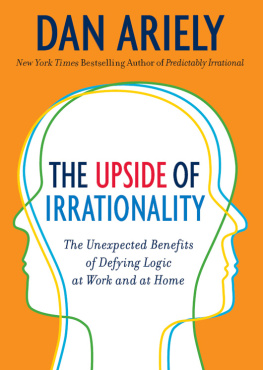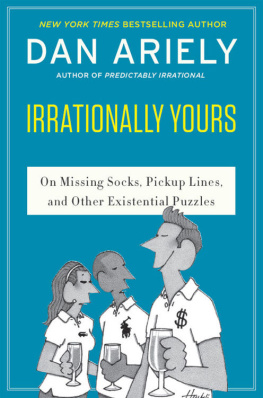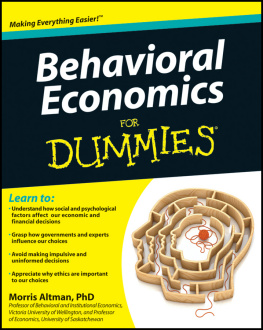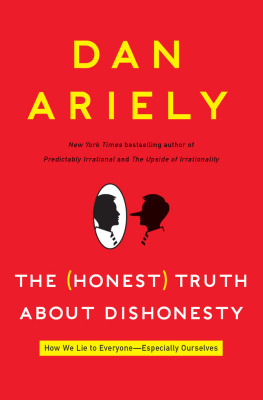How an Injury Led Me to Irrationality and
to the Research Described Here
I have been told by many people that I have an unusual way of looking at the world. Over the last 20 years or so of my research career, its enabled me to have a lot of fun figuring out what really influences our decisions in daily life (as opposed to what we think, often with great confidence, influences them).
Do you know why we so often promise ourselves to diet, only to have the thought vanish when the dessert cart rolls by?
Do you know why we sometimes find ourselves excitedly buying things we dont really need?
Do you know why we still have a headache after taking a one-cent aspirin, but why that same headache vanishes when the aspirin costs 50 cents?
Do you know why people who have been asked to recall the Ten Commandments tend to be more honest (at least immediately afterward) than those who havent? Or why honor codes actually do reduce dishonesty in the workplace?
By the end of this book, youll know the answers to these and many other questions that have implications for your personal life, for your business life, and for the way you look at the world. Understanding the answer to the question about aspirin, for example, has implications not only for your choice of drugs, but for one of the biggest issues facing our society: the cost and effectiveness of health insurance. Understanding the impact of the Ten Commandments in curbing dishonesty might help prevent the next Enron-like fraud. And understanding the dynamics of impulsive eating has implications for every other impulsive decision in our livesincluding why its so hard to save money for a rainy day.
My goal, by the end of this book, is to help you fundamentally rethink what makes you and the people around you tick. I hope to lead you there by presenting a wide range of scientific experiments, findings, and anecdotes that are in many cases quite amusing. Once you see how systematic certain mistakes arehow we repeat them again and againI think you will begin to learn how to avoid some of them.
But before I tell you about my curious, practical, entertaining (and in some cases even delicious) research on eating, shopping, love, money, procrastination, beer, honesty, and other areas of life, I feel it is important that I tell you about the origins of my somewhat unorthodox worldviewand therefore of this book. Tragically, my introduction to this arena started with an accident many years ago that was anything but amusing.
O N WHAT WOULD otherwise have been a normal Friday afternoon in the life of an eighteen-year-old Israeli, everything changed irreversibly in a matter of a few seconds. An explosion of a large magnesium flare, the kind used to illuminate battlefields at night, left 70 percent of my body covered with third-degree burns.
The next three years found me wrapped in bandages in a hospital and then emerging into public only occasionally, dressed in a tight synthetic suit and mask that made me look like a crooked version of Spider-Man. Without the ability to participate in the same daily activities as my friends and family, I felt partially separated from society and as a consequence started to observe the very activities that were once my daily routine as if I were an outsider. As if I had come from a different culture (or planet), I started reflecting on the goals of different behaviors, mine and those of others. For example, I started wondering why I loved one girl but not another, why my daily routine was designed to be comfortable for the physicians but not for me, why I loved going rock climbing but not studying history, why I cared so much about what other people thought of me, and mostly what it is about life that motivates people and causes us to behave as we do.
During the years in the hospital following my accident, I had extensive experience with different types of pain and a great deal of time between treatments and operations to reflect on it. Initially, my daily agony was largely played out in the bath, a procedure in which I was soaked in disinfectant solution, the bandages were removed, and the dead particles of skin were scraped off. When the skin is intact, disinfectants create a low-level sting, and in general the bandages come off easily. But when there is little or no skinas in my case because of my extensive burnsthe disinfectant stings unbearably, the bandages stick to the flesh, and removing them (often tearing them) hurts like nothing else I can describe.
Early on in the burn department I started talking to the nurses who administered my daily bath, in order to understand their approach to my treatment. The nurses would routinely grab hold of a bandage and rip it off as fast as possible, creating a relatively short burst of pain; they would repeat this process for an hour or so until they had removed every one of the bandages. Once this process was over I was covered with ointment and with new bandages, in order to repeat the process again the next day.
The nurses, I quickly learned, had theorized that a vigorous tug at the bandages, which caused a sharp spike of pain, was preferable (to the patient) to a slow pulling of the wrappings, which might not lead to such a severe spike of pain but would extend the treatment, and therefore be more painful overall. The nurses had also concluded that there was no difference between two possible methods: starting at the most painful part of the body and working their way to the least painful part; or starting at the least painful part and advancing to the most excruciating areas.
As someone who had actually experienced the pain of the bandage removal process, I did not share their beliefs (which had never been scientifically tested). Moreover, their theories gave no consideration to the amount of fear that the patient felt anticipating the treatment; to the difficulties of dealing with fluctuations of pain over time; to the unpredictability of not knowing when the pain will start and ease off; or to the benefits of being comforted with the possibility that the pain would be reduced over time. But, given my helpless position, I had little influence over the way I was treated.
As soon as I was able to leave the hospital for a prolonged period (I would still return for occasional operations and treatments for another five years), I began studying at Tel Aviv University. During my first semester, I took a class that profoundly changed my outlook on research and largely determined my future. This was a class on the physiology of the brain, taught by professor Hanan Frenk. In addition to the fascinating material Professor Frenk presented about the workings of the brain, what struck me most about this class was his attitude to questions and alternative theories. Many times, when I raised my hand in class or stopped by his office to suggest a different interpretation of some results he had presented, he replied that my theory was indeed a possibility (somewhat unlikely, but a possibility nevertheless)and would then challenge me to propose an empirical test to distinguish it from the conventional theory.
Coming up with such tests was not easy, but the idea that science is an empirical endeavor in which all the participants, including a new student like myself, could come up with alternative theories, as long as they found empirical ways to test these theories, opened up a new world to me. On one of my visits to Professor Frenks office, I proposed a theory explaining how a certain stage of epilepsy developed, and included an idea for how one might test it in rats.

